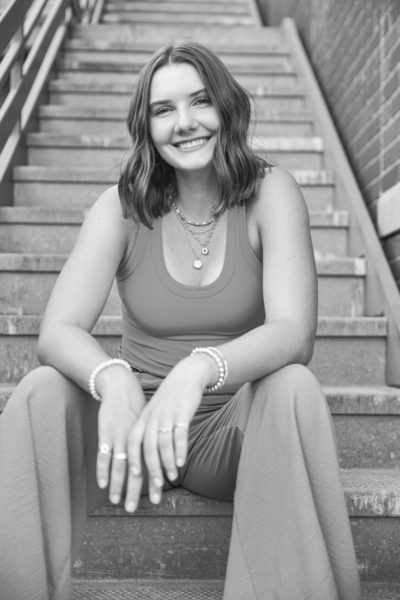Taking a Timeout
March 9, 2023
Cross Country runner Kaylee Spurbeck ‘24 sat in her blocked math class feeling overwhelmed, disheartened and discouraged – but not because of trigonometry. The season had come to a close, but Spurbeck was not satisfied. As her classmates struggled to solve equations, Spurbeck composed a lengthy text message to her coach under her desk,
“I understand that it is my first year and I don’t really know what I am doing but still. I think I am setting too high of standards for myself but I will still hold that pressure over myself. I thought I was going to perform a lot better. Right now I feel like I am one of the worst runners on the team…I just don’t understand what I am doing wrong.”
Spurbeck is just one of many student athletes who struggle with their mental health.
Lauren Millang ’24 participates in football cheer, wrestling cheer and competition cheer. Millang struggles to find time to prioritize her well-being amidst her busy schedule,
“I find it a lot harder in season to get my work done and it’s a lot more stressful, I get a lot less sleep and my eating habits aren’t as good because I don’t have time to eat every night for dinner. A lot of things contribute to the mental health decline.” Millang said.
Cortlynn Jackson ‘23 ran her final season of cross country last fall and is playing basketball this winter. While Jackson is looking forward to playing collegiate basketball at William Penn University, she admits she bases her “happiness and self worth” off of how she performs.
Spurbeck relates to Jackson’s struggle, “When I don’t perform the way I think people thought I would, it makes me super upset and it’s very discouraging and kinda digs you in a hole in a way.” Spurbeck continues, “Because I was disappointed with my performance, it was changing the way I was acting in my everyday life.”
Lauren Hendrickson ‘24 has been playing varsity tennis since her freshman year, and acknowledges that her stress spikes during the season. Like many athletes, Hendrickson holds herself to a high standard,
“I remember I was so angry with myself and my playing that I literally hit my racket against my leg so hard that I created lines and bruises on my leg that formed the next day.” Hendrickson said.
While athletes are often their own worst critics, other people’s expectations can often warp athletes’ self confidence and make them second guess themselves.
As the 2021 summer olympics approached, all eyes were on gymnast Simone Biles. Biles took home five medals during her Olympic debut in Rio in 2016, and was projected to win gold in Tokyo. However, Biles stunned the world after she withdrew from the team finals and four other events soon after. Biles chose to prioritize her safety and mental health,
“We also have to focus on ourselves, because at the end of the day, we’re human, too…we have to protect our mind and our body, rather than just go out there and do what the world wants us to do.” Biles said, according to The Associated Press.
Biles is not alone. According to Trine University, “A National College Health Assessment reported about 31% of male and 48% of female NCAA student-athletes reported having depression or anxiety symptoms.”
Iowa basketball player Patrick McCaffery recently announced he will be taking time away from the sport after revealing he has been “battling anxiety for a while, and recently it has peaked, which has inhibited [McCaffery’s] preparation and performance on the court,”
Spurbeck reflects, “When will I stop doing things to please other people and when will I finally do it for myself?”
Naomi Osaka, pro tennis player and highest paid female athlete frequently advocates for mental health awareness; she herself struggles with depression and anxiety on and off the court. Osaka has sparked major controversy in the past for refusing to speak with the press after matches, or withdrawing from tournaments such as the 2021 French Open.
In Osaka’s TIME article, ‘It’s O.K. Not to Be O.K.’ she states,
“Perhaps we should give athletes the right to take a mental break from media scrutiny on a rare occasion without being subject to strict sanctions.”
Cari Naanep, a two-time state tennis singles champion and current senior at the University of Iowa received lots of support from coaches and teammates, while she felt the most pressure came from “non-tennis players/students at Johnston.”
The Center for Sports Psychology and Mental Health offers athletes tips for overcoming high pressure situations and learning how to respond after mistakes are made (which are inevitable) including, “visualization, easing off perfection, treating yourself as you would your teammates, changing how you look at the situation and breathing.”
According to Peak Performance Sports, “The sporting event contains no pressure in and of itself. This is important… there is zero pressure in a sporting event…Pressure is an internal experience (a feeling) that is created by the athlete.”
Jonah Frey ‘23 ran his final season of cross country last fall and is looking forward to running track in the spring. “The pressure is definitely a real thing, being expected to run a certain time or get a certain place to remain varsity. It comes down to ignoring the pressure and running for yourself and your own goals. Self pressure is better than external pressure in my opinion.” Frey said.
Peak Sports Performance suggests to “Focus on what you can control for your role, not the outcome that leads you to worry and feel pressure.”
“I felt like I needed to win back to back and I pushed myself too hard at times, but I do feel that the more I took care of myself mentally the better I was physically.” Naanep said.
Prominent athlete and influencer Victoria Garrick Browne played four years of Division I volleyball at USC and uses her platform to normalize mental health struggles and promote body positivity. In 2019, Browne founded the Hidden Opponent, an “Accredited non-profit and advocacy group that raises awareness for student mental health and addresses the stigma within sports culture.”
The idea of a similar group forming in the high school is exciting for many student athletes,
“I think it would help to talk about it and get it out so they feel like they have a place for them,” Jackson said.
Millang agrees that a group would “Let students know that they’re not alone and that they have people to talk to if they’re feeling overwhelmed.”
Frey also believes having a group would be beneficial, however he notes some may struggle to open up.
“I believe it would be hard to get enough athletes going to a mental health club, due to the fact that young males in our society feel a pressure to keep feelings inside, and to not be ‘soft.’” Frey continues,
“I am not sure exactly how the female athletes at our school feel, but I’m sure they feel a similar pressure to avoid being ‘soft’ as well. It’s unfortunate, and a club like that would be a great idea, as long as people are willing to open up and go.”
Michael Phelps, 23 time Olympic gold medalist is vulnerable about his past struggles with his depression and anxiety, “We’re supposed to be big, macho, physically strong human beings, but this is not a weakness…we are seeking and reaching for help,” Phelps told Healthline.
Spurbeck notes many athletes are in the same boat, “We’re all experiencing the same thing no matter what the sport so at least you have somebody to connect with.” Spurbeck said.
Osaka stresses the importance of opening up, “I do hope that people can relate and understand it’s O.K. to not be O.K., and it’s O.K. to talk about it. There are people who can help, and there is usually light at the end of any tunnel,” she wrote in her TIME article.
Browne echoes Osaka in one of her speeches,
“I was completely wrong about mental health. It takes more bravery, more strength, more courage, to open up to someone about what you’re struggling with. I think it’s easier to say nothing. So, let’s rewrite this narrative.”




